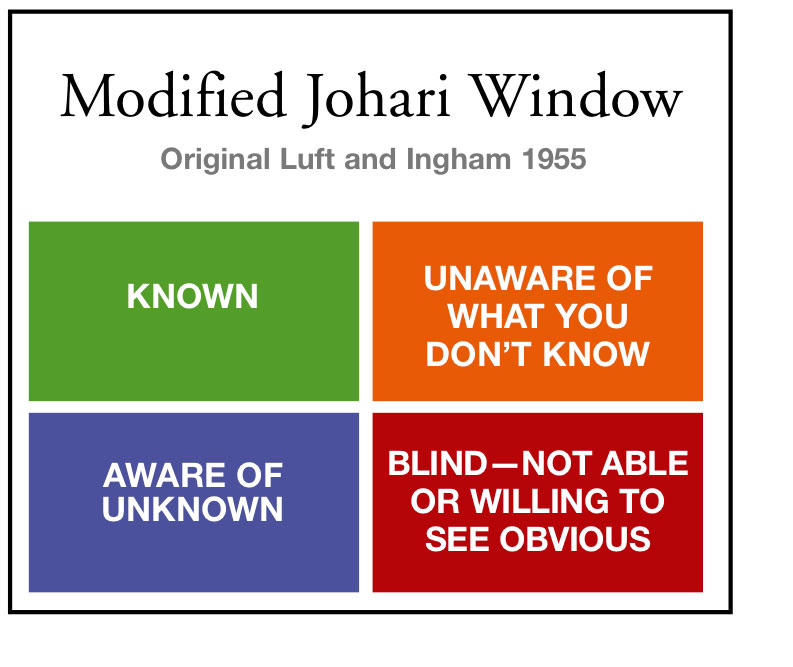10/1/2020
View Success Through Johari’s Window
Bill McCurry

While at a very small coffee shop in semi-rural New Jersey, I heard a man six feet behind me talking on his phone. “I have to do something about the woodpeckers on my house …” When he hung up, I turned around.
“How many trees do you have around your house?”
“Lots,” he answered.
I explained that when we last moved, we let most of the garden go native. If a tree died, we pruned it so potentially falling branches weren’t a danger and left the snags for “the critters.” The dead branches lined the flowerbeds and became critter piles. This provided a haven for the woodpeckers and rescued our house from their attacks.
He gratefully explained he was a retired AT&T engineer trained in using Johari’s window to assess information before making important decisions. What I told him filled a category, for which he was very grateful.
Johari’s window was developed from research by Joseph Luft and Harry Ingram in the 1950s. Conceived as a self-reflection tool, some corporations today use its simple structure to determine information needs before making critical decisions. Let’s look at the four categories of information and how they affect your business:
1 | Known: This refers to what you currently know. This category is obvious and very simple to determine.
2 | Aware of Unknown: You know there are things you don’t know, but you don’t care because they aren’t relevant. For instance, if you don’t know the distance from here to the moon, the lack of that information won’t impact decisions about your garden center.
 3 | Unaware of what you don’t know: This is dangerous. Without critical information, you’re on an unlevel playing field. There are enough challenges already without creating more obstacles. Examples could be a new variety that’s growing in popularity, but missing in your displays, a newly redesigned gardening tool unsuccessfully being requested by name at your sales counter or even a significant price difference missed because you’re not a member of a leading buying group—or not taking advantage of group buying at all. You may have valid reasons for not doing any of these, but then it’s information that belongs in the “known” category. It’s what you don’t realize you don’t know that bites you hard when you least expect it.
3 | Unaware of what you don’t know: This is dangerous. Without critical information, you’re on an unlevel playing field. There are enough challenges already without creating more obstacles. Examples could be a new variety that’s growing in popularity, but missing in your displays, a newly redesigned gardening tool unsuccessfully being requested by name at your sales counter or even a significant price difference missed because you’re not a member of a leading buying group—or not taking advantage of group buying at all. You may have valid reasons for not doing any of these, but then it’s information that belongs in the “known” category. It’s what you don’t realize you don’t know that bites you hard when you least expect it.
4 | Blind: Not able or willing to see the obvious: If you aren’t open to new varieties or in-demand products that don’t come from your favorite supplier or preferred sales rep, your bias will mean your customers won’t see the latest and greatest at your garden center. Your store becomes stale. Your competitors generate excitement that lures away your customers. Your bias against suppliers who aren’t “most favored” limits your ability to compete.
No one wants to believe they’re biased. The same open-mindedness that keeps us from bias about race, creed, country of origin, etc. needs to exist in every situation we encounter. Biases cost money, good customers and the best employees. You can’t afford to cater to your biases.
Whether you believe you’re a better negotiator or you dislike buying groups, whatever your rationale, it’s misguided. Have you looked at the facts objectively? Have you talked to successful buying group members to understand what benefits they get?
Biases and preconceived notions are a real threat to proper decision making. This year is tough enough without complicating it by being blind to new opportunities. Look through Johari’s window and discard your blindness. Ask questions and listen with an open mind. GP
Bill McCurry would love to hear from you with questions, comments or ideas for future columns. Please contact him at wmccurry@mccurryassoc.com or (609) 688-1169.